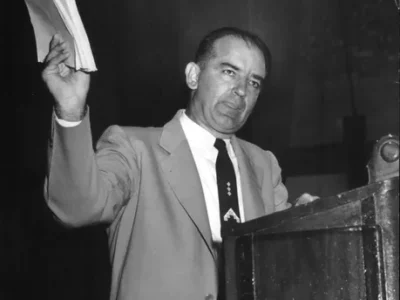Boxer-Kerry pre-draft released
UPDATE: The full bill as introduced is posted here on Senator Kerry’s web site, and a 19-page section-by-section summary is here. (Hat tip: Ben Somberg, Center for Progressive Reform.)
Senators Boxer and Kerry are expected to introduce their greenhouse gas regulation bill on Wednesday. The Washington Post has posted what it describes as a “close-to-final” version of the bill that clocks in at a cool 801 pages. Obviously there’s a lot here. One positive addition compared to Waxman-Markey is direction to EPA to set performance standards for large stationary sources of GHG emissions — that’s an aspect of the Clean Air Act that should work as well for greenhouse gases as for conventional pollutants. Another improvement is the addition of transportation planning provisions, taking on the problem of transportation sector emissions from the vehicle miles traveled perspective, as well as the tailpipe perspective.
Reader Comments
3 Replies to “Boxer-Kerry pre-draft released”
Comments are closed.







Why is it that climate change bills in both houses seem embarrassed to admit that they would address climate change? The Boxer-Kerry bill uses the word “energy” three times in its intro (the title is blank), and refers to “jobs” … and the “economy” (at least it does mention “global warming,” almost as an afterthought).
It is as if the 1970 Congress titled NEPA the “American Environmental Scientist Jobs Creation Act of 1970” instead of National Environmental Policy Act. This is brownwashing — the opposite of greenwashing — and it is pretty clear to me that we will not collectively do anything to address climate change as long as our leaders are embarrassed to admit that there is a problem to address.
Karl, you make an excellent point, which is reinforced by the title of the introduced bill, “The Clean Energy Jobs and American Power Act.”
I think the administration is largely responsible for the energy and “green jobs”-heavy framing of the climate legislation debate, which continues a major theme of the election campaign. Clearly, it represents a judgment that legislation framed in those terms is more politically salable, presumably because that framing should help short-circuit claims that cap-and-trade will bankrupt the country (although those claims continue to be made, even in the face of strong evidence to the contrary).
As you point out, though, there is also a real political cost to this reframing, which downplays the seriousness of the problem, and even comes close to sweeping it altogether under the rug. If the goal is just to stimulate the economy, there are surely many other ways that federal policy can do that. Only by keeping clear in the public mind the importance of limiting the rate and extent of global climate change can advocates of this sort of legislation hope to rally enough political support to achieve their goals.
“Another Climate Bill Avoids the C Word”
http://dotearth.blogs.nytimes.com/2009/09/30/another-climate-bill-avoids-the-word-climate/